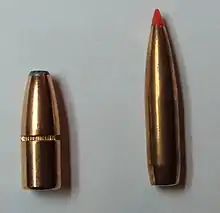пуля
Russian

Две пули
Etymology
Inherited from Middle Russian пуля (pulja, “bullet, arquebus projectile”), att. since 1620s. As suggested by Chernykh and proven by Zoltan, a back-formation from пулька (pulʹka, “bullet; projectile in general”) (att. 1580s), itself a dissimilated borrowing from Old Ruthenian кулька (att. 1550s), from Middle Polish kulka, from Old Polish kulka (att. 1497), from kula (att. 1461), from Middle High German kūle, a rare variant of kugele, itself of uncertain origin.
Pronunciation
- IPA(key): [ˈpulʲə]
Audio (file) Audio (file)
Usage notes
Strictly speaking пу́ля is the solid projectile fired from the firearm, as opposed to патро́н which consists of the assembled bullet, casing, propellant, and primer.
Declension
Related terms
- пулево́й (pulevój)
- пулемёт (pulemjót)
- пуля́ть (puljátʹ)
Descendants
- → Yakut: буулдьа (buulja)
This article is issued from Wiktionary. The text is licensed under Creative Commons - Attribution - Sharealike. Additional terms may apply for the media files.